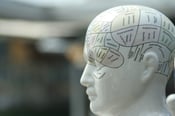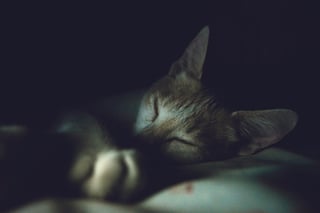It turns out that there’s lots of documented scientific evidence that the more you exercise, the better you eat, and the more you sleep (within reason), the better...
Does Better Sleep Equal Better Grades?
Just as the energizer bunny must recharge his batteries every now and then, humans must also take time to power down, rest  and recharge for the following day. But just how important is it to get a full nights rest?
and recharge for the following day. But just how important is it to get a full nights rest?
Could getting the right amount of sleep (which for many people nowadays means more sleep) beneficially affect academic performance? Indeed, this is exactly what much of the data shows.
In fact, learning, memory and brain development are some of the most important reasons we, as human beings, even need sleep. Sleep deprivation is shown to have deleterious effects on multiple body and organ systems (Aldabal et al., 2011). Studies show that sleep deprivation is the number one factor associatd with poorer academic performance among multiple educational levels from middle school to college students (Pagel et al., 2010). Even more worrisome is the fact that adolescents that reported tiredness and trouble sleeping associated with negative academic performance were likely candidates for drug/alcohol abuse, negative mood, antisocial behavior and feelings of isolation (Pagel et al., 2010). If it’s not surprising that we need more sleep to perform better and feel happier, what is stopping us from getting it? Turns out there are a few simple techniques you can e xcercise to battle fatigue and increase your quality of sleep that this article will discuss.
xcercise to battle fatigue and increase your quality of sleep that this article will discuss.
Technique 1: Stop texting/instant messaging in bed after “lights out”!
A new study in the Journal of Child Neurology states that messaging after “lights out” caused students to report shorter sleep duration, higher rate of daytime sleepiness, and poorer academic performance (Grover et al., 2016). It’s no surprise that children and adolescents today are glued to their electronic devices, particularly smartphones. The advent of social media has revolutionized how we interact with the world and our social relationships with our fellow man and woman, boy and girl. However, while we do seem more connected on one hand, recent evidence indicates there may be detrimental aspects to excessive social media use and electronics use in the developing mind. Thus, it is important to disconnect from the digital world upon bedtime and focus on relaxation and sleep. Unlike normal face-to-face conversation, texting leaves things “open ended” making it harder to disengage from a conversation since it’s never really “over”. This may cause increased stress, anxiety and anticipation at nighttime preventing sleep. Refraining from instant messaging and digital screen exposure at nighttime before bed has been shown to increase the quality and duration of one's sleep (Grover et al., 2016).
Technique 2: Listen to relaxing music during bedtime.
A 2008 study by Harmat et al., demonstrated that relaxing classical music is an efficacious intervention to reconcile sleep problems such as insomnia and difficulty falling asleep. The study explicitly stated that music can reduce sympathetic nervous system activity, decrease anxiety, blood pressure, heart and respiratory rate and may have positive effects on sleep via muscle relaxation and distraction from thoughts (Harmat et al., 2008). Thus, after you finish texting and decide it's time for bed, try putting on a little Mozart softly in the background to help you drift off to sleep! It’s a much cheaper and safer alternative to taking sleep medications.
Technique 3: Mindfulness Meditation
There has been a lot of data and talk about the benefits of meditation lately. Indeed, as a long-time practitioner, I can attest anecdotally to its innumerous benefits on the mind and body. However, from a research standpoint, there is much data out now that can be translated and applied to everyone’s daily lives. The practice of mindfulness meditation can be invoked to lower blood pressure, improve the quality of ones sleep, and even reduce inflammation by reducing levels of NF-κB, an inflammation factor in our bodies (Black et al., 2015). To learn more about mindfulness meditation, click here to hear my good friend and fellow neurologist, Dr. Matthew Markert, speak on the Benefits & Barriers to Mindfulness in Medicine in which he discusses a few techniques on practicing mindfulness.
Technique 4: Melatonin
 The majority of the advice given in this article was meant to steer one away from taking any sort of medication or pills to promote sleep as to confer long-term benefits and healthy behaviors instead of simply invoking a temporary short-term fix. While there is several medications that can, rather quickly at times, induce sleep, they are ineffective long-term remedies due to the dependence they cause and the side effects they carry. However, there is one natural supplement that has proven its novel use in promoting sleep for decades now, and that supplement is: Melatonin. This supplement has gained a lot of popularity a being a “wonder drug” for the many individual suffering from sleep disorders. It is known that melatonin helps regulate circadian rhythms and promote sleep. Furthermore, it is shown to reduce the onset of sleep in children, which can be very beneficial (Buscemi et al., 2006).
The majority of the advice given in this article was meant to steer one away from taking any sort of medication or pills to promote sleep as to confer long-term benefits and healthy behaviors instead of simply invoking a temporary short-term fix. While there is several medications that can, rather quickly at times, induce sleep, they are ineffective long-term remedies due to the dependence they cause and the side effects they carry. However, there is one natural supplement that has proven its novel use in promoting sleep for decades now, and that supplement is: Melatonin. This supplement has gained a lot of popularity a being a “wonder drug” for the many individual suffering from sleep disorders. It is known that melatonin helps regulate circadian rhythms and promote sleep. Furthermore, it is shown to reduce the onset of sleep in children, which can be very beneficial (Buscemi et al., 2006).
Technique 5: Diet; Don’t Eat Right Before Bed!
It probably shouldn’t be surprising after reading my last article on nutrition that eating healthy has an effect on our sleep cycle. A 2011 study indicated that consuming food right before bed can have detrimental effects upon sleep quality (Crispim et al., 2011). I suppose this calls into question an old saying my father used to tell me, “after lunch nap a while, after dinner walk a mile!” Perhaps this would be beneficial since lunchtime napping sleep quality probably isn’t as important as sleeping at nighttime (not to mention, unless you’re in Spain, not too many people have time for naps after lunch!) In any case, allowing your food to digest and giving yourself enough time between your last meal and going to sleep may significantly affect sleep quality.
There is a widely diverse ocean of data and studies that overwhelmingly support the notion that better sleep equals better grades. Such aspects of diet, nutrition and sleep should be further encouraged in the classroom as a mechanism to promote healthier lifestyles, and consequently, better grades. The data calls for more research on this topic; however, the current database of literature provides various techniques, such as the aforementioned, to improve sleep quality as a method to increase academic performance.
About the Author
Gaurav Dubey is the Founder & Executive Producer of BIOLITICS Podcast & Biolitics.org. He has his Master's of Science in Biotechnology from Rush Univeristy. He's a published stem cell biologist who left his doctoral research to further progress the state of scientific journalism through Biolitics & other related endeavors.
References
Aldabal, L., & Bahammam, A. S. (2011). Metabolic, endocrine, and immune consequences of sleep deprivation. The Open Respiratory Medicine Journal, 5 doi:10.2174/1874306401105010031
BaHammam, A. S., Alaseem, A. M., Alzakri, A. A., Almeneessier, A. S., & Sharif, M. M. (2012). The relationship between sleep and wake habits and academic performance in medical students: A cross-sectional study. BMC Medical Education, 12(1), 1-6. doi:10.1186/1472-6920-12-61
Black, D. S., O’Reilly, G. A., Olmstead, R., Breen, E. C., & Irwin, M. R. (2015). Mindfulness meditation and improvement in sleep quality and daytime impairment among older adults with sleep disturbances: A randomized clinical trial. JAMA Internal Medicine, 175(4), 494-501. doi:10.1001/jamainternmed.2014.8081 [doi]
Buscemi, N., & Witmans, M. (2006). What is the role of melatonin in the management of sleep disorders in children? Paediatrics & Child Health, 11(8), 517-519. doi:pch11517 [pii]
Crispim, C. A., Zimberg, I., dos Reis, B. G., Diniz, R. M., Tufik, S., & de Mello, M. T. (2011). Relationship between food intake and sleep pattern in healthy individuals. Journal of Clinical Sleep Medicine : JCSM : Official Publication of the American Academy of Sleep Medicine, 7(6), 659-664. doi:10.5664/jcsm.1476 [doi]
Curcio, G., Ferrara, M., & De Gennaro, L. (2006). Sleep loss, learning capacity and academic performance. Sleep Medicine Reviews, 10 doi:10.1016/j.smrv.2005.11.001
Grover, K., Pecor, K., Malkowski, M., Kang, L., Machado, S., Lulla, R., . . . Ming, X. (2016). Effects of instant messaging on school performance in adolescents. Journal of Child Neurology, 31(7), 850-857. doi:10.1177/0883073815624758 [doi]
Harmat, L., Takacs, J., & Bodizs, R. (2008). Music improves sleep quality in students. Journal of Advanced Nursing, 62(3), 327-335. doi:10.1111/j.1365-2648.2008.04602.x [doi]
Pagel, J. F., & Kwiatkowski, C. F. (2010). Sleep complaints affecting school performance at different educational levels. Front Neurol, 1 doi:10.3389/fneur.2010.00125
